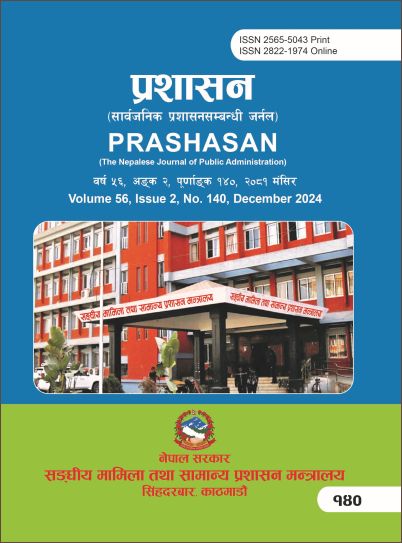Promoting Inclusive Basic Service Delivery in the Federal Context of Nepal: A Policy Position Paper from the Experience of Karnali Province
DOI:
https://doi.org/10.3126/prashasan.v56i2.75333Keywords:
Evidence-based policymaking, federalism, inclusive basic service delivery, IBSDAbstract
This policy recommendation paper explores the implementation of inclusive basic service delivery (IBSD) within Nepal’s federal structure, focusing specifically on Karnali Province. The study examines the opportunities and challenges arising from decentralization since Nepal became a federal democratic republic in 2015. The primary objective is to assess how federalism can enhance service delivery by tailoring it to diverse communities, drawing on global best practices such as Brazil’s Bolsa Família program and India’s National Rural Health Mission (NRHM). The methodology includes a qualitative analysis of existing policies, challenges, and opportunities in Karnali Province, with a review of international case studies. Key findings reveal that while decentralization has the potential to improve service delivery, challenges such as resource constraints, political interference, inconsistent policy application, and socio-cultural barriers persist. The paper recommends empowering local governments with more autonomy and resources, fostering community participation, and establishing robust monitoring and evaluation systems to address these issues. These strategies aim to enhance the efficiency and inclusiveness of basic service delivery in Nepal’s federal context. Adapting successful international models to Nepal’s unique context, while addressing systemic barriers, is essential for improving public services and promoting greater inclusivity in Karnali Province and across the country. Strengthening decentralized governance is crucial for achieving equitable outcomes and enhancing public trust.
Downloads
Downloads
Published
How to Cite
Issue
Section
License
- The copyright of published materials of the journal remains with Ministry of Federal Affairs and General Administration.
- The published article cannot be reproduced or copied commercially by any person or institution but it can be used non-commercially for academic, research and training purpose providing proper citation is given.




